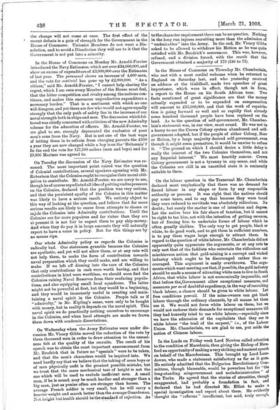On the labour question in the Transvaal Mr. Chamberlain declared
most emphatically that there was no demand for forced labour in any shape or form by any responsible authority or persons. It was right that the natives should pay some taxes, and to say that because they were taxed they were reduced to servitude was absolutely ridiculous. No doubt ; but surely the matter is one of intention and degree. Let the native bear his fair share of taxation, but it cannot be right to tax him, not with the intention of getting revenue, but of forcing him to undertake forms of labour which he often greatly dislikes. The only way to get people, black or white, to do good work, and to get them in sufficient numbers, is to pay them wages large enough to attract them. In regard to the question of white labour, Mr. Chamberlain did not apparently quite appreciate the arguments, or at any rate he only met that of the faddists who entertain the ridiculous and mischievous notion that gold-mining is a corrupt and wicked industry which ought to be discouraged rather than en- couraged. This argument is easily overthrown. The argu- ments which want meeting are that, if possible, the gold industry should be made a means of attracting white men to live in South Africa, that white labour is not economically impossible, and that before the-,Government allow exceptional measures, and measures per se of doubtful expediency, in the way of recruiting black labour, a chance should be given to white labour. Let free conditions prevail. If the mine-owners can get black labour through the ordinary channels, by all means let them use it. We would not force white labour on them, but we would not endorse their demands for exceptional measures till they had honestly tried to use white labour,—especially since we have the admission of the capitalists that they see in white labour " the trail of the serpent," i.e., of the Labour Union. Mr. Chamberlain, we are glad to see, put aside the notion of Chinese labour.










































 Previous page
Previous page